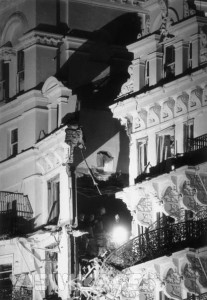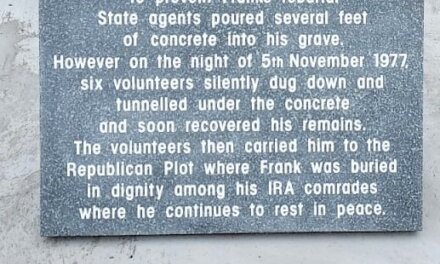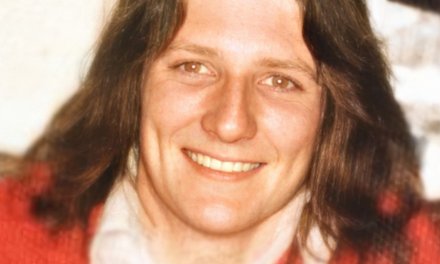 Today’s edition of the London ‘Independent’, on the thirtieth anniversary of Margaret Thatcher first becoming British Prime Minister, takes opinions on what effects her premiership had on a cross-section of people, including her treatment of the hunger strikers. There is some passionate testimony, illustrating the anger of the time. Among those interviewed were Danny Morrison, Secretary of the Bobby Sands Trust, a ‘working-class rocker’ who refers to the IRA’s attack on Thatcher at the Grand Hotel in Brighton, and a Greenham Common protestor. To read the article in full see here.
Today’s edition of the London ‘Independent’, on the thirtieth anniversary of Margaret Thatcher first becoming British Prime Minister, takes opinions on what effects her premiership had on a cross-section of people, including her treatment of the hunger strikers. There is some passionate testimony, illustrating the anger of the time. Among those interviewed were Danny Morrison, Secretary of the Bobby Sands Trust, a ‘working-class rocker’ who refers to the IRA’s attack on Thatcher at the Grand Hotel in Brighton, and a Greenham Common protestor. To read the article in full see here.
‘Maggie and me: By those who love her (and those who didn’t)’
The hunger-strike spokesman
The hunger strikes which took place in the Maze Prison in 1981 were the culmination of five years of dispute between the British government and the IRA. Imprisoned IRA activist Bobby Sands argued that he and fellow ex-paramilitaries should be declared political prisoners, not regular criminals. Thatcher disagreed. Sands, who with nine others died as a result of the strikes, communicated to the outside world via spokesman Danny Morrison, 56, now secretary of the Bobby Sands Trust.
“In 1982 I was elected to the Northern Ireland Assembly and Ken Livingstone, then at the GLC, invited me and Gerry Adams to come over for peace talks. But then the IRA began bombing London. Just before we were due to fly out, I got a call from a friend who asked me, ‘Have you seen Channel 4?’ I switched it on. The news reader was saying that Gerry and I were banned from travelling to London. If we were to try, we could serve five years in jail. But at the same time as Thatcher excluded us, she was also condemning the exclusion of Russian dissidents from Moscow. The woman was a total hypocrite. I despised her. I remember when her son got lost in the desert during a car rally two years after the hunger strikes, I thought, ‘Now you know how Bobby’s mother felt, and you wouldn’t move a finger.’ For her to say those prisoners were not ‘political’…they later acknowledged it in the 1998 Belfast Agreement. But it was too late for the ten that died.”
The working-class rocker
One of the songs that defined the Thatcher era was The Specials’ ‘Ghost Town’. Released when unemployment figures soared in 1981, it echoed the social unrest of the moment with its lyrics “Can’t go on no more/the people getting angry”. Roddy Byers, aka Roddy Radiation, who joined the band in 1978, played guitar on the record.
“None of us were keen on Thatcher, to put it mildly. When we were touring the UK during the early days, things were tough. Some of us had only just come off the dole, and the situation across the country seemed tragic. Most working class people we knew hated her. She was a target. Someone to blame Britain’s troubles on. It got to the stage in Coventry, when the Brighton hotel was bombed in 1984, lots of people said, ‘it’s a shame they didn’t get her’, and that was because we hated her so much. It seemed like she didn’t give a toss about anyone who wasn’t well-to-do. She won in the Falklands, but I didn’t even know where that was. I thought it was near Scotland. I dare say the people there feel British, but it’s a long way to go to hang on to it. We thought we could change the world and that was one of the reasons we did ‘Ghost Town’. In retrospect it was one of the strongest things we ever did. I wrote a song when The Specials split up called ‘Don’t Drive Me’ about Thatcher, how she would get her comeuppance one day, and she did, when she lost power. People were a lot more socialist in the 1980s. We all used to say, ‘when the revolution comes, we will sort them all out’. That was the climate, but now people aren’t so left-wing. They seem more selfish.”
The Greenham Common protester
In 1979, in what it claimed was a response to the stockpiling of nuclear weapons by the USSR, NATO decided to base ground cruise missiles at the Greenham Common air base in Berkshire. Thatcher was a fervent supporter of nuclear defence. By September 1981 a permanent, women-only peace camp was established at the Greenham gates. Dr Rebecca Johnson spent five years there in the 1980s, later founding the Acronym Institute for Disarmament Diplomacy in 1995.
“Convoys of cruise missiles were taken on deployment exercises from Greenham about once a month, travelling on public roads, usually at night, escorted by large numbers of British police. In 1987, I was severely beaten after lying in the road at Amesbury roundabout to demonstrate against one such convoy. For the time it took the nuclear weapons to pass I was subjected to appalling violence by a sergeant. I was terrified, I was going to die and lost consciousness. I came to, just as he got off me, and asked for his number. But he pulled away, laughing. I was on the ground so I could only grab his sleeve. A bit like the proverbial ‘arrested for damaging a police boot with your head’, I was then charged with criminal damage to his uniform.
Thatcher oversaw the militarisation and politicisation of the police force as never before. At Greenham, in Northern Ireland and later in the miners’ strike we saw the police used in far more political roles than before. She believed that that if she could outdo the men on toughness, including war-mongering and aggressive posturing, she could retain her position of power in the UK. Though she benefited from feminism, Thatcher was profoundly anti-feminist. She demonstrated that the issue is not biology, but power structure, values and ways of working. If the political system is structured so that a single woman gets to the top via a patriarchal structure where men retain the essential power, she will have to constantly prove that she is tougher than the men, and that she can promote their power and their interests even more aggressively than they can.”




